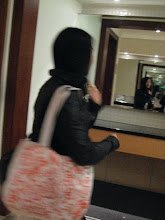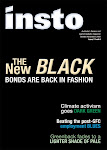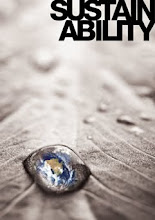0
His baby blues peered apologetically from under a mop of blonde hair...
Somehow this line, like many others, didn't wash too well with our Reuters lifestyle editor. Nevertheless, you can find the latest article on the so-called 'iPod Generation' here.
Just an aside on this one, readers:
It started out as a quirky story idea, then turned into my final assignment for Print Features, a subject I took in the semester that just passed. The general correspondent at work asked me "What's happening?" in one of his particularly cheery moods, I started telling him about the assignment, and he seemed really interested. I got some pretty detailled advice on how to approach the problems I was having with writing it. The conversation ended with a "send it to me when you're done". I thought this was just yet another generous gesture of mentor-like concern, which he has shown on countless occasions during my time at Reuters.
Turns out he'd interpreted my uni woes as a sales pitch, so you can imagine my surprise when I came into work one day and rather than 'hi' he said "I've started editing your story, its in your basket have a look." (aside to the aside, I love how seasoned journos never greet colleagues with an obligatory office greeting but are almost always in a conversation about the story of the day that doesn't end just because you haven't seen them for the last 12 hours). I also love how this man- whom I'd describe as being like William Forrester to my Jamal Wallace, or, for the more recent pop culture-reference-friendly people, like Dr Cox to my JD; ok maybe not that far, but basically, the personal writing tutor I never had- can talk to this lowly disciple as just another colleague. Its one of the greatest forms of respect and flattery I could ever hope to have gotten at Reuters thus far).
After a little back-and-forth banter about what should go in, stay out, be reworded, and a general talk on the confines of wire-service features, the final product emerged. I've gotta say, Print Features was one of the only subjects in my 2 yrs of this degree, in which I truly found myself questioning whether I've got what it takes to be a writer. Surrounded by unbelieveably brilliant ones, I actually felt like maybe that aspect of the industry, though I'd always aspired to end up in it, wasn't for me. This really gave me hope that maybe I've still got a shot at it. And though what ended up being published is totally different to what was probably envisioned by the magazine-style class objectives we'd been taught, I'm really proud of it. This is particularly because this was the first story I've written for Reuters, for which the idea, contacts and research were entirely done by me, and most of it was retained for the final version.
Sadly, this is probably also going to be the last one published from the Sydney bureau, as I leave them in a few short weeks time to go overseas. Hopefully there'll be more on the way with Reuters in London, but for that we'll just have to wait and see.
[Update: It can now be found on Reuters India, Yahoo! News, AOL News and Sydney Australia Lawyer News.]
Just an aside on this one, readers:
It started out as a quirky story idea, then turned into my final assignment for Print Features, a subject I took in the semester that just passed. The general correspondent at work asked me "What's happening?" in one of his particularly cheery moods, I started telling him about the assignment, and he seemed really interested. I got some pretty detailled advice on how to approach the problems I was having with writing it. The conversation ended with a "send it to me when you're done". I thought this was just yet another generous gesture of mentor-like concern, which he has shown on countless occasions during my time at Reuters.
Turns out he'd interpreted my uni woes as a sales pitch, so you can imagine my surprise when I came into work one day and rather than 'hi' he said "I've started editing your story, its in your basket have a look." (aside to the aside, I love how seasoned journos never greet colleagues with an obligatory office greeting but are almost always in a conversation about the story of the day that doesn't end just because you haven't seen them for the last 12 hours). I also love how this man- whom I'd describe as being like William Forrester to my Jamal Wallace, or, for the more recent pop culture-reference-friendly people, like Dr Cox to my JD; ok maybe not that far, but basically, the personal writing tutor I never had- can talk to this lowly disciple as just another colleague. Its one of the greatest forms of respect and flattery I could ever hope to have gotten at Reuters thus far).
After a little back-and-forth banter about what should go in, stay out, be reworded, and a general talk on the confines of wire-service features, the final product emerged. I've gotta say, Print Features was one of the only subjects in my 2 yrs of this degree, in which I truly found myself questioning whether I've got what it takes to be a writer. Surrounded by unbelieveably brilliant ones, I actually felt like maybe that aspect of the industry, though I'd always aspired to end up in it, wasn't for me. This really gave me hope that maybe I've still got a shot at it. And though what ended up being published is totally different to what was probably envisioned by the magazine-style class objectives we'd been taught, I'm really proud of it. This is particularly because this was the first story I've written for Reuters, for which the idea, contacts and research were entirely done by me, and most of it was retained for the final version.
Sadly, this is probably also going to be the last one published from the Sydney bureau, as I leave them in a few short weeks time to go overseas. Hopefully there'll be more on the way with Reuters in London, but for that we'll just have to wait and see.
[Update: It can now be found on Reuters India, Yahoo! News, AOL News and Sydney Australia Lawyer News.]








